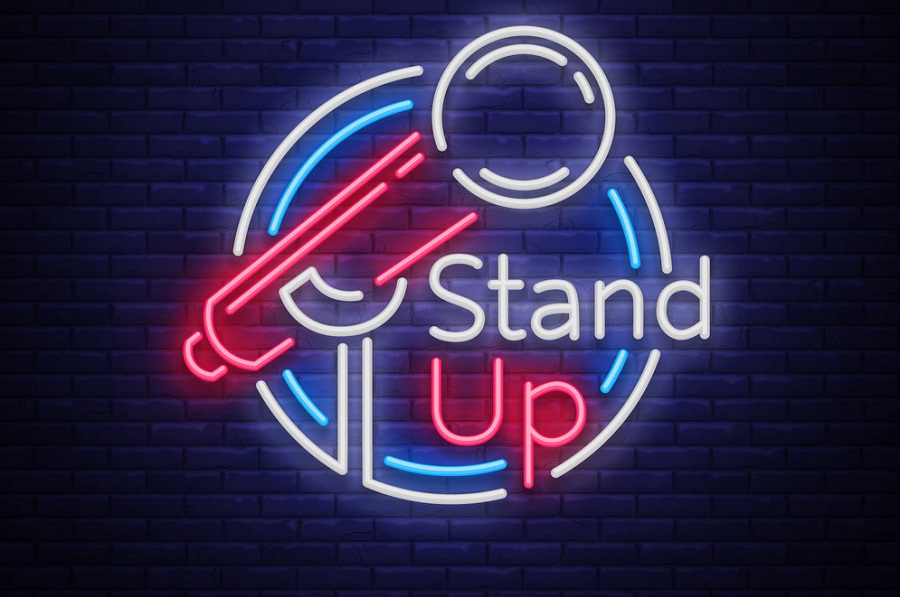
Published :
Updated :

"Kothae hashte hobe underline kore den" (Underline where I am supposed to laugh) —while this phrase might evoke a chuckle among Bangladeshis, it also highlights a more profound truth about our relationship with humour. There's no denying that Bangladeshis possess a remarkable sense of humour, from witty banter at tea stalls to the clever memes that flood social media every time the Bangladesh cricket team faces defeat.
But the laughter seems muted when it comes to stand-up comedy. While neighbouring countries like India have embraced and celebrated stand-up, giving rise to stars and massive platforms, Bangladesh's journey into this realm has been slower.
Only a few names, like Amin and Ashik, traditionally come to mind when thinking of Bangladeshi stand-up, but the reality is shifting. Recently, stand-up comedy culture has begun to flourish, with brave new voices—both male and female—taking the stage in cafes and comedy clubs across the country.
Social media becomes a platform for videos where comedians are stepping into the spotlight—filled with punchlines, wit, and a fearless ambition to change the entertainment scene of Bangladesh. Yet, while they're winning over fans, this journey is anything but straightforward.
According to Ashraful Haque Emu, an emerging comedian, the comedy culture gap is about timing. "Stand-up comedy as live entertainment is still pretty new here in Bangladesh," he explains, comparing it to India, where the industry is more established.
With social media spreading awareness, people are becoming more interested and accepting of comedy as a cultural force. But Mr Ashraful points out another factor: "The idea of paying for a comedy show is pretty new here, too. Spending 300 taka on a 1.5-hour show still feels a bit daunting."
Tashdid Ashrar has a similar perspective. "People aren't very comfortable speaking their minds here," he says, which he believes has held the culture back. But he sees the scene getting bigger every day,"
Ashrar adds that there's a massive potential for growth as people warm up to the concept and, with time, see it as more than just a hobby or an internet trend.
Sharar Shayor, another rising comedian, is optimistic that the stand-up will become famous soon. "It's getting popular in the last four years," he says, after the post-pandemic social media boom.
Mr Sharar even predicts that stand-up will soon be the "second most popular live event after music concerts." This is a significant leap forward from a nearly non-existent scene a decade ago.
While Bangladesh has no rigid legal barriers, comedians must tread carefully with cultural and social expectations. Ashraful Haque Emu explains, "We don't overthink legalities, but we're mindful not to encourage anything harmful."
He emphasizes that while topics like politics and social issues can be explored with some newfound freedom since the August 5 student movement, comedians remain conscious of respecting beliefs. "Comedy should unite, not divide," Ashraful adds.
For Tashdid Ashrar, the focus is on understanding his audience's sensitivities. He highlights the importance of adapting jokes to the demographic.
"It's about reading the room and tweaking content based on the audience's age or background." Knowing what resonates is crucial; he adds, "A 16-year-old and a 40-year-old will not relate to similar materials. However, if a comedian can make both parties laugh at his jokes, he is doing it right."
Comedy is rarely a get-rich-quick business, but Bangladeshi comedians are finding innovative ways to build careers. While more than ticket sales are needed to sustain a comedian's lifestyle, new revenue streams are emerging.
Corporate gigs, event hosting, and brand collaborations create fresh opportunities for comics to earn while reaching wider audiences. Corporate events are getting popular and become a platform where stand-ups are performed.
In a country where stand-up comedy is still finding its footing, comedians face unique hurdles in building a career and connecting with audiences. Mr Ashraful explains the difficulty of gaining recognition for comedy as a legitimate profession.
"When I tell people I'm a comedian, they often look at me like I'm doing something shady," he jokes, pointing out that the concept of live, structured comedy is still unfamiliar to many. Educating people about stand-up as an art form remains a vital part of his work.
For Tashdid, the struggle is to fill seats. "We push to get people in the door," he shares, mentioning that the uncertainty of turnout, even minutes before a show, can be stressful.
For every laugh, comedians face a fair share of sceptics and critics. Comments like "kothae hashte hobe underline kore den" ("underline where I'm supposed to laugh") have become a running joke among Bangladeshi comics.
Shayor has a good-natured take on this trend, noting that many people leave such comments as a joke themselves without criticizing the material. "I think I'm funny," Sharar says with conviction. "And every comedian must believe that because how else would others find you funny if you don't?"
Stand-up comedy is a fresh expression in Bangladesh that resonates deeply with audiences and artists. While the journey is still fraught with challenges—be it revenue, acceptance, or social restrictions—comedians are finding ways to thrive.
The road ahead may be long, but the support within the community and the increasing curiosity from audiences show that stand-up comedy has a bright future in Bangladesh. Sharar says, "We just have to be a little patient." The journey might be slow, but it's certainly moving forward, one punchline at a time.
mahdiabzaman@gmail.com


 For all latest news, follow The Financial Express Google News channel.
For all latest news, follow The Financial Express Google News channel.